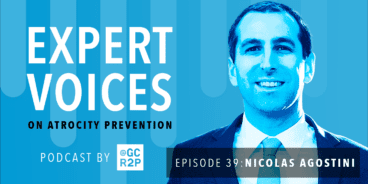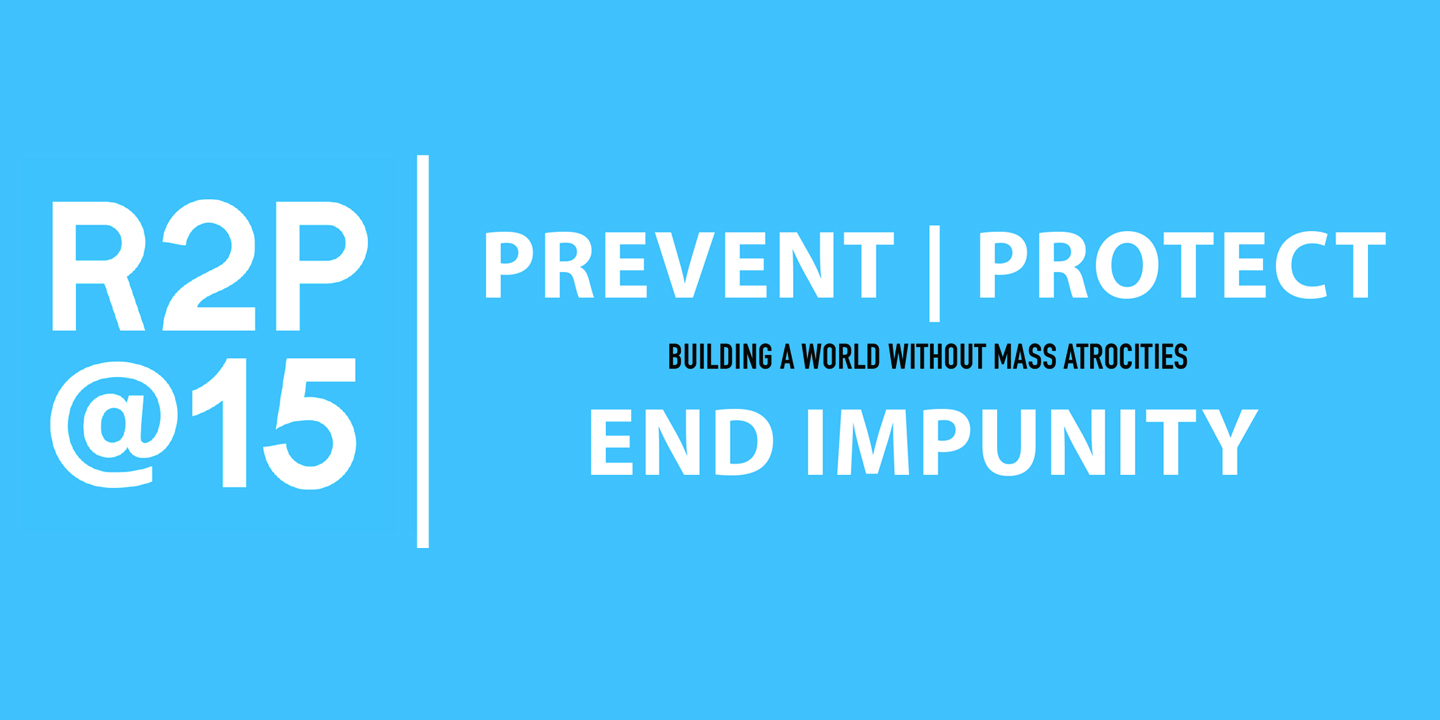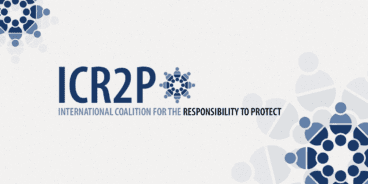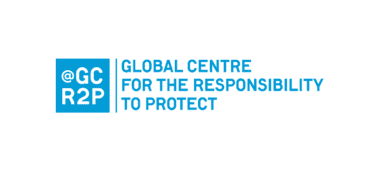

Atrocity Crimes and Preventive Diplomacy: Reflections on R2P’s 15th Anniversary
Fifteen years ago the Responsibility to Protect populations from genocide, war crimes, ethnic cleansing and crimes against humanity was unanimously adopted at the United Nations World Summit, the largest gathering of Heads of State and Government in history. To mark the 15th anniversary the Global Centre is publishing a series of reflections by key actors in the development of R2P. In this piece, Ambassador Ivan Šimonović shares lessons he learned regarding the prevention of atrocity crimes while serving as the UN Assistant Secretary-General for Human Rights and as UN Special Adviser on R2P. While reflecting on various country situations, Ambassador Šimonović explains what can be achieved through “atrocity crimes prevention diplomacy.”
Introduction
When invited to contribute an article as a part of the Global Centre for Responsibility to Protect’s commemoration of the 15th anniversary of the Responsibility to Protect (R2P), I decided to use this opportunity to send a clear message: practical implementation is crucial for R2P’s future. It is implementation or marginalization, as I put it while I was the UN’s R2P mandate holder.
This article is based on my personal experiences with a specific aspect of R2P’s implementation: atrocity crimes prevention diplomacy. I am aware that some diplomats may be skeptical about singling out atrocity prevention as a specific sort of diplomacy, and that some activists may doubt whether diplomacy is the best way to address situations where there is a rising threat of atrocity crimes. However, I was personally involved in what I label as “atrocity crimes prevention diplomacy” in various capacities: as a Croatian diplomat and humanitarian negotiator during the conflict in the former Yugoslavia, and within the UN as the Assistant Secretary-General (ASG) for Human Rights and as the Secretary-General’s Special Adviser on the Responsibility to Protect. I am convinced that acknowledging specifics of this diplomatic activity can contribute to the success of preventing atrocity crimes. I hope that out of practical experiences some useful lessons may be learned.
Atrocity Crimes Prevention Diplomacy in Action
The essence of atrocity crimes prevention diplomacy is to convince people of influence in situations where there is a threat of atrocities to refrain from committing crimes and to help in preventing them. Trying to convince people of influence means readiness to speak to all important actors, no matter how disagreeable their ideologies or actions.1 The level of success of such efforts depends on many factors, such as: credibility of persons involved, their leverage and skills, support they receive, availability and responsiveness of people of influence in the country under threat, and the timing of preventive action.
Accurate information on the threat of atrocity crimes, as well as on atrocities already committed and their perpetrators, is crucial. It is important that information should be as timely, as complete and as reliable as possible. Of course, the problem is that collecting, cross-checking and verifying information takes time, which may delay lifesaving action. Sometimes a useful tactic may be to approach the receptive government immediately after receiving concerning information and requesting they provide information on the situation while simultaneously collecting and verifying information from other sources. Many organizations involved in operational atrocity crimes prevention activities, such as the Office of the UN High Commission for Human Rights (OHCHR), Amnesty International or Human Rights Watch, have developed methodologies that enable them to strike the right balance between competing claims.
Various actors have different comparative advantages for prevention and best results can be achieved if they work together. For example, while sometimes civil society actors can be quicker, UN officials or state officials who need to have a higher threshold of accuracy and more demanding cross-checking, may have more political clout. However, senior UN or foreign government officials who have influence on overall policy decisions, and whose assessment can have a wide media pick-up, have a special leverage.
Unlike traditional diplomats and mediators involved in conflict prevention, those involved in preventing atrocity crimes should not be neutral, treating all sides in a situation with equal respect. Atrocity crimes prevention is similar and closely related to the human rights diplomacy: those involved must be impartial, treating all victims equally, no matter which side they belong to, but always siding with them. They must be ready to be blunt and to stand firm to high officials, warning them of consequences if they are involved in atrocities, or if they do not prevent them when they could and should.
At the same time, being blunt and committed is not enough to be successful in atrocity crimes prevention diplomacy: actors need to have some diplomatic skills and know which buttons to push. Sometimes this will mean resorting to discreet diplomacy, while other times speaking up, including through evidence-based naming and shaming. It also requires balance: some individuals who are (in)famous for frequent naming and shaming will not likely be received by high level officials, while others who are perceived to be incapable of speaking up, will not be listened to carefully.
At a meeting dealing with a deteriorating country situation – during which I represented OHCHR – some individuals within the UN criticized our Office for speaking up. But Secretary-General Ban Ki-Moon accepted my view that the UN sometimes does not have to speak with one voice, that different entities may speak in their individual voices, reflecting their specific mandates, but that they should speak in harmony. In practice, it meant that OHCHR may speak sooner and bolder than others, buying time and creating space for the Secretary-General himself. The same logic should apply to the Special Advisers on the Prevention of Genocide and R2P, but they were not mentioned at the time. Ideally, those involved in preventing atrocity crimes should have some autonomy, which allows them to be bolder, while at the same time having strong backing for their actions by the whole UN system. When absolutely needed for political reasons, the Secretary-General could distance himself from their activities.
Besides their skills, the support received by atrocity crimes prevention diplomacy actors contributes to its chance of success. When it is clear that, if their warnings are unsuccessful, there would be some serious consequences such as the launching of a Commission of Inquiry or adoption of a UN Security Council resolution with punitive measures (potentially including targeted sanctions or referral to the International Criminal Court (ICC)) for example, the leverage of such actors is significant. Therefore, part of the diplomatic effort in atrocity crimes prevention is also to mobilize maximum support. Besides support of influential foreign governments, regional organizations or the UN, local support from government officials, independent human rights institutions, as well as various local civil society actors and the media, is also important.2
During the conflict in Central African Republic in 2013, I spoke with Christian and Muslim religious leaders about their potential role in atrocity crimes prevention. Their joint visits to emerging crisis spots around the country certainly contributed to prevention. However, the success was limited because of a lack of conformity by some local clerics, who continued inciting divisions and violence.
It is also important not to have powerful spoilers actively involved in a situation. For example, if there are permanent UN Security Council members supporting certain countries and their leaders unconditionally, no matter what they do, it makes it increasingly difficult to influence their behavior.3
Sometimes it is questioned whether threats of prosecution by foreign or international courts and tribunals of those responsible for the commission of atrocity crimes can have a practical impact on the behavior of national actors. My experience is: yes, they can.
When some twenty years ago I interviewed my Zagreb law school students regarding whether they think that the establishment of the International Criminal Tribunal for the former Yugoslavia (ICTY) deterred atrocities, contributed to the establishment of reliable historical record, and brought justice to the victims, their answers were that: ICTY considerably contributed to the establishment of the reliable historical record, brought some justice to the victims, but unfortunately failed in prevention. When I asked the same question of high level military officers who attended my humanitarian law course at the Croatian war college, their answers were just the opposite: ICTY contributed to atrocity prevention and influenced their personal behavior during the conflict, brought some justice to the victims, but unfortunately did not help establish a reliable historical record.
My experience is also that the more individualized, concrete and realistic the threat of sanctions, the more efficient these sanctions are in their likely deterrent effect.
During the 2010-2011 conflict in Côte d’Ivoire, then-President Laurent Gbagbo brutally suppressed the supporters of the opposition candidate, Alassane Ouattara. After the UN verified that Ouattara had won the elections, Gbagbo refused to cede power. The UN had a lot of information about the involvement of Gbagbo and other senior officials in atrocity crimes and was looking for ways to prevent them. After Secretary-General Ki-Moon approved an idea we presented to him, the High Commissioner for Human Rights, Navi Pillay, sent individualized letters to the regime’s four top political and military officials, informing them of the allegations regarding ongoing atrocities and their role in them, and reminding them of their obligations under international law, including personal consequences they may face if they do not respect such obligations.
The general problem with preventive action is that you can never be sure of its effects. Although in Côte d’Ivoire some atrocities continued, all four who received the individualized warning letters were very concerned, which makes it likely that receiving those letters had some effect on their behavior. Some of them even responded to the letter, informing High Commissioner Pillay about their personal efforts to prevent atrocities.
Soon after, the UN received information that supporters of president-elect Ouattara perpetrated a massacre of civilians in Duékoué on 28-29 March 2011. In my capacity as ASG for Human Rights I was in Abidjan at the time and able to travel to the massacre site soon after it had been committed to verify the information.4 I immediately met with Ouattara in the Golf Hotel, where he was being protected by UN troops, and informed him of the incident and its legal consequences, including potentially for him personally. His reaction was swift and positive: in his televised address he condemned commission of all atrocity crimes and promised prosecution for perpetrators, no matter what side they belonged to.
During the conflict in South Sudan I had similar individualized discussions in person and over the phone with President Salva Kiir and his rival and Vice President Riek Machar, as well as with their top military leaders. All of them, with the exception of one military leader, were interested in discussing the allegations of atrocities and possible consequence for them under the concept of command responsibility.
Unfortunately, it is impossible to influence some leaders, even in situations with a serious threat of atrocity crimes.
When the president of one country I interacted with was confronted with the prospect of the possible starvation of the population as a consequence of a civil war in his country, he responded to a high UN humanitarian official: “Well, it is your problem, not mine.” When I was with Secretary-General Ki-Moon during his discussion with the country’s other head of state, it was obvious that arguments did not matter: the president genuinely believed that he was receiving instructions directly from God.
But with the leaders that can be influenced, success can also be linked to timing. Leaders must be approached before their involvement in atrocity crimes reaches the point of no return. If the threat of individual consequences for their actions is real, but still avoidable, they will be most amenable to altering their behavior. Accordingly, the ability of the Security Council to prevent further atrocities is greatest when it is in a position to decide on a referral of the crimes to the ICC, but it has not done so yet.5
In many situations of conflict during which atrocity crimes were committed, the tension between peace and justice is very real. In the short term, pursuing accountability for atrocities committed by those in power may undermine peace efforts. However, in the long run, impunity encourages new cycles of violence and atrocities.
At a retreat of the UN Secretary-General’s senior advisers in Alpbach in 2010, I participated in a heated debate on this issue. The consensus that we reached at the time seems a reasonable one. If, in the short run, accountability of persons in power is seriously detrimental to peace efforts, a delay in prosecuting them may be acceptable if practical action is immediately taken to preserve criminal evidence and if there is ongoing progress towards accountability.
Conclusion: What Lessons Can Be Learned?
Atrocity crimes prevention diplomacy is just an ambitious title for an already existing practice. Acknowledging its importance may help to improve the prevention of atrocities. The various actors involved in such work should adopt similar methodological approaches, be aware of various tools at their disposal, and have broad political backing for their activities.
I would like to focus especially on the role of UN actors in atrocity crimes prevention diplomacy. It is essential that the UN acknowledges the importance of operating as a team, providing relative autonomy and broad support for those involved in these endeavors.
A good example of the usefulness of such cooperation was the division of labor between the Under-Secretary General for Political Affairs, Jeffrey Feltman, and myself in my capacity as ASG for Human Rights when responding to the crisis in Ukraine. He was involved in classic high-level UN diplomacy and communicated discretely with the key political actors in Kiev and Moscow. I, on the other hand, was involved in establishing the Human Rights Monitoring Mission in Ukraine in March 2013 and, soon after, its regional offices throughout the country, including in areas controlled by the rebel forces. The mission provided reliable reports on grave human rights violations, atrocities that had been committed and ongoing threats. That enabled me to bluntly raise concerns with officials in Kiev, as well as with the rebel leaders. Both of us profited in our respective roles from the exchange of information, assessments and coordination of our complementary activities.
The paradox is that while I was very much involved in the operational side of atrocity crimes prevention diplomacy – visiting countries at risk and talking to political and military leaders – when I was the ASG for Human Rights, I was prevented from doing the same when I became Special Adviser on R2P. Not that I did not want to do it, but the position lacked an operational mandate, with its focus on the conceptual and political development of R2P. As a result, my office did not have resources nor logistical support to do such work.
If we want to improve atrocity crimes prevention, we must overcome the resistance of some UN member states to giving an operational role to the UN actor who is mandated to prevent atrocity crimes. In situations of escalating threat, the Special Advisor for R2P has a crucial role to play in a diversified team of operational UN field actors.

It would probably be difficult to immediately introduce such an institutional change in the current climate of global strengthening of authoritarianism and weakening of multilateralism, human rights and the rule of law (as well as while prioritizing the fight against COVID-19 and its consequences). Probably the best way forward is to start the process of reform through small, practical steps. Various senior UN officials should jointly help to close the current gap: the Special Adviser on the Prevention of Genocide should extend their field activities to include, besides genocide, prevention of other atrocity crimes, namely war crimes, ethnic cleansing and crimes against the humanity. Some OHCHR senior advisers should also be prioritizing field activities in countries where human rights violations indicate rising risks of atrocity crimes.
Finally, the Special Adviser on R2P should interpret their current mandate creatively and be involved in prevention activities in the field. Such activities should be supported, including through financial and logistical support. Some elements of the described process of “reforming by doing” are already ongoing, but much more needs to be done. Crucial in this respect is convincing a majority of UN member states that in order to prevent atrocity crimes more efficiently, there is a general need for the strengthening of the UN’s diplomatic activity, that the UN Secretary-General supports such a course of action, and that at least some member states – especially those participating in the Group of Friends of R2P – provide necessary funding.
While we may have to wait for the stars to align to enable a more ambitious institutional breakthrough, we should still proceed with small steps towards advancing the UN’s atrocity crimes prevention diplomacy and learn from past practical experience of what works best.
Notes
1 For example, I discussed the civilian casualty reports, the UN attribution of responsibility for civilian killings and ways to prevent them with the Political Commission of the Taliban. I also discussed deliberate targeting and indiscriminate attacks against civilians, prisoner releases and prevention of torture with rebel leaders in Ukraine.
2 In every government there are some officials who are who are willing to support human rights and prevention of atrocity crimes more than others.
3 The initiatives to reduce the veto power of permanent members of the Security Council in situations where there is a serious threat of atrocity crimes should therefore be strongly supported.
4 I was able to talk to witnesses and families of the victims, as well as soldiers of the UN’s Moroccan battalion, who buried some victims.
5 Once leaders are indicted, they may feel cornered and have nothing more to lose. However, waiting too long for a referral to the ICC, or for indictments by international tribunals, may be morally objectionable. Milosevic was not indicted by the ICTY for his involvement in atrocities committed in Croatia or Bosnia and Herzegovina until after NATO intervened against Serbian forces in Kosovo in 1999.

